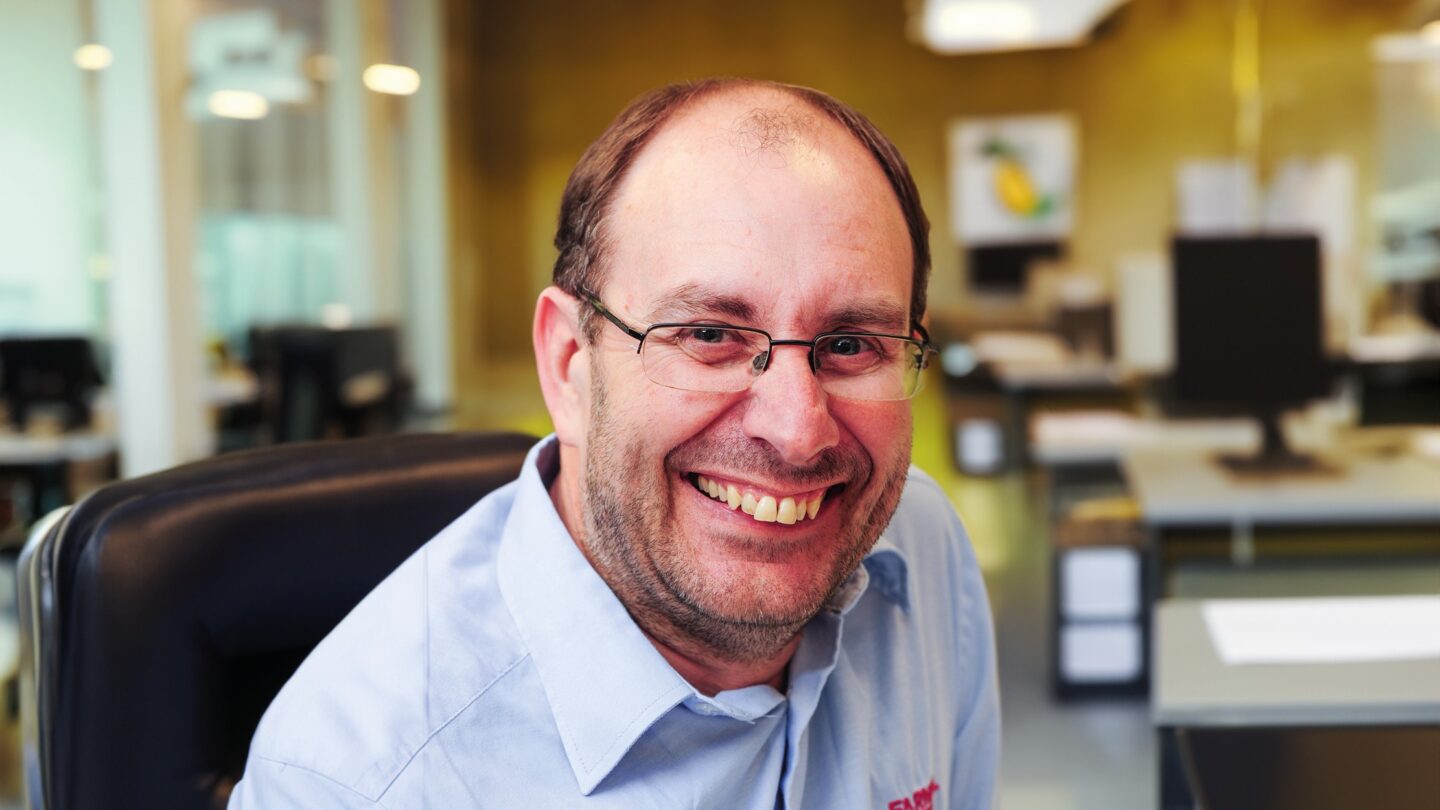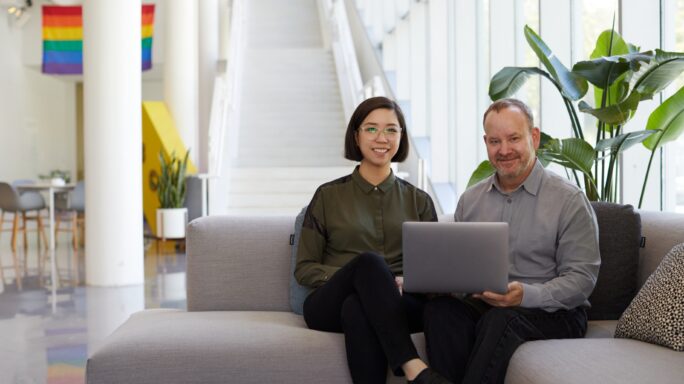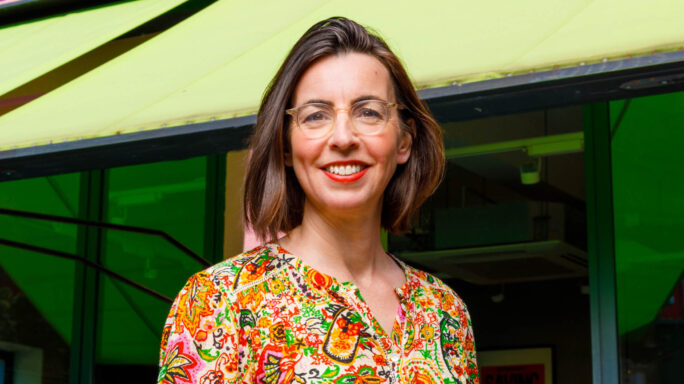Growth & Customers
How to build – and scale – a more human business
Will Farnell, author of The Human Firm and founder of accountancy firm Farnell Clarke, shares tips to create a scalable, client-centric company.

Never miss an episode
Subscribe to the Sound Advice podcast
Subscribe by email and get the Sound Advice podcast delivered to your inbox every month with a ton of related articles, templates and problem solving guides for small businesses so you can put our Sound Advice podcast into practice.
Will Farnell spills all his top tips on how companies, not only in the accountancy industry but across the board, can implement true innovation and tight processes to help create sustainable growth and create a more client-centric business.
With his own successful accountancy firm, Farnell Clarke, we explore all of Will’s own mistakes when starting up, from not strategically planning for growth to still opening the daily post to micromanage every aspect of his firm.
In this episode, you’ll learn how to build a scalable human company by encouraging innovation throughout your culture, letting go of tasks and driving your business’s purpose in everything you do.
Don’t forget to check out Will’s latest book, The Human Firm for even more juicy advice.
Here’s his unfiltered advice below:
- Becoming more client centric with The Human Firm
- What does a human firm look like?
- Highlight your business’s purpose and culture in all interviews and inductions
- The biggest challenge is maintaining sustainable growth and putting in the correct process to manage it
- Could six-hour working days and unlimited holidays be effective for your company?
- Drive innovation throughout every aspect of your business
- Don’t underestimate your growth potential—plan ahead for it
- Make your employees the champions of tasks you can let go of
- Businesses must prepare for the generational shift in future employees
- Find your business’s purpose, prepare for scale and focus on your client experience
Becoming more client centric with The Human Firm
Kate Bassett:
Will, you published The Digital Firm back in 2018. What prompted you to write The Human Firm five years later?
Will Farnell:
It’s kind of been an evolution, really.
So when I wrote The Digital Firm in 2018, it was very much a case of this is what we’ve done as a business, as an accounting firm.
And the thing is we did lots of things that were very different in one of those industries that’s perhaps one of the hardest to kind of innovate in and be different.
And a lot of it was a case of, well if we could do this as accountants, anyone can do this in any kind of business.
You’ve just got to think differently about what you do.
But The Digital Firm was really the story of the journey that we went on. It was targeted at accountants to provide almost a blueprint for them to be able to understand how to deploy technology to get closer to their clients, to deliver better value in everything they do.
And the sector has evolved, and it’s not just accounting.
Tech plays a huge part in every sector, but we’re getting to a point where everyone’s got access to the same technology.
So literally anyone can go out, we can all buy the tools that drive our business power, our business from an accounting point of view. Everyone can go and use Sage and all of these other tools that help them run better businesses.
So what else can we do that that sets us apart, differentiates us?
And for me, and we’re seeing everything going on with AI and ChatGPT, it’s all about humans. So it’s about our teams and the people we have in our organisation. How do we ensure that they’re living and breathing our purpose as an organisation?
But equally, how do we position what we do to clients? How do we position what we do for our customers that gives us a uniqueness that’s much harder for anybody else to replicate.
So it’s really an evolution about how do we become more client-centric?
How do we recognise shifting expectations of current and incoming generations of employees that have different aspirations, different objectives from life?
And as employers we need to match that.
So The Human Firm is really about the next evolution. It’s plotting the course for what I believe a business for the next decade really looks like.
So it’s really exciting to have launched it a couple of weeks ago and hit number one bestseller on Amazon on day of release.
So it’s been a couple of whirlwind weeks.
What does a human firm look like?
Kate Bassett:
Being customer-centric and human really gives you that competitive advantage.
But can you sum up in a couple of sentences what a human firm looks like?
Will Farnell:
I think it depends on what sector you’re in.
So for me, I start all of these books with almost a framework. And the framework here for me with The Human Firm and something that I came to recognise probably two years ago when I first set my firm up, I had a really clear purpose.
I didn’t think about it as purpose, I just wanted to change the world.
And that was kind of the thought I had sitting in my garage, in my back garden thinking I’m single-handedly going to go out, and I’m going to change the way professional services are delivered and the way that people that use those services perceive them.
And to many, that was probably quite arrogant because I was sitting there in my garage on my own, but I fundamentally believed that we could do better as a profession.
That was my purpose. And we hear lots of people talk about purpose now.
And in the book I talk about the power of purpose. And the reason I talk about the power of purpose is because that’s why I set my business up, and it drove every decision that I made in the way that I grew the business.
But it was just why I did it and I didn’t think about it. I didn’t plaster over walls or anything else.
And it was only a couple of years ago that I made this connection that actually the clarity that I had about what I wanted to deliver had forced me to make particular decisions without actually correlating the two things together.
So I think that’s the centre, that’s the hub of what a human firm is because you have to understand why you do what you do.
And we’ve also had challenges as well, so having grown at the level we have over a number of years, we’re essentially doubling in size every three years.
That creates huge challenges but also huge learnings.
And the reason that this power of purposing became so obvious to me is when we stopped talking to people about why we existed as a business.
When I was trying to almost extract myself a bit more from day-to-day operations of the business, we lost that kind of connection with people that were joining the organisation.
And it was incredible how quickly we started to see things go wrong as soon as we took that away.
So that’s the hub of The Human Firm. That drives what we do for clients, that drives the experience we deliver for clients.
And then for me, it’s about how we balance our approach to our team and our approach to our customers and clients. And it’s getting that balance right in terms of the way that we provide career opportunity, the way we build a personality for us as a firm that goes beyond brand.
And from a client point of view, thinking about how do we find ways to add more value to our clients because the by-product of that is that we generate new revenue.
So it’s a business that fundamentally understands the purpose of the organisation, is committed to the purpose of the organisation, and has clarity around what the goals and aspirations are of our clients.
Highlight your business’s purpose and culture in all interviews and inductions
Kate Bassett:
So you almost had that sort of light bulb moment about the power of purpose.
But how have you then communicated that to your customers, and how do you reflect that brand to your employees as well?
Will Farnell:
So that’s where we went wrong is because we just assumed that everybody picks it up. Somebody joins the organisation and culture’s kind of there, it just happens, but it doesn’t.
You’ve got to be really deliberate about it.
And the reason it stopped working is I stopped doing inductions myself and our MD stopped sitting in our interviews.
So we almost as we were bringing new people into the organisation, we left other people to talk about why people should come and work for us. And they had a very different aspiration about what that interview role was.
Whereas we would always have started with, this is Farnell Clarke, this is what we are about, this is what we do differently. And that meant that either people were really keen to come and work for us because they brought into what we were doing.
Or even in some cases we had people say, “You know what? That’s not the culture for me.” And it meant that we avoided making hiring mistakes in that process as well.
So what we’ve done now is we’ve gone back to making sure that I’m doing inductions, we’ve brought in HR directors and things that are the challenges of just scaling a business anyway because as the entrepreneur you end up doing everything, and you’ve got to work out what the right time is for you to kind of take that step back and bring somebody in that can deliver that stuff for you.
So bringing in HR director inputs and structure around that, me stepping back into inductions and making sure that everybody understands why we exist, making sure that everybody reads a copy of the books and things like that.
It’s making sure that new team members understand what we’re about as a business to make sure that we get that purpose, vision, values really embedded.
And then it’s a case of measurement.
How do you measure that? How do you make sure that your team are buying into and living those values?
So we do that through performance appraisal and as well as the objectives that we set our team members. It’s also, look, how did you demonstrate this value?
You mentioned clients as well. I think the way we’ve done this is another part of The Human Firm kind of framework is that after we have purpose and client experience, we have what we call client value proposition and employee value proposition.
So this is a clearly articulated statement that tells our clients what we do and how we do it and tells our employees what we do and how we do it.
So we’re being very public about what it is that we’re offering to both our clients and our employees.
The biggest challenge is maintaining sustainable growth and putting in the correct processes to manage it
Kate Bassett:
You talked there about timing, which I’d love to dive into a bit with you because I know you said that there is a consistency of timing as to when business owners hit hurdles.
So at what stages did Farnell Clarke hit hurdles, and how did you overcome them?
Will Farnell:
I make this point regularly, and I’ve spoken to so many business owners over the years that have also gone through high growth. And we’re talking about kind of SMEs here in the small end of SMEs, because it’s living our experience, we’re 75 people in our team now.
Every firm that I’ve spoken to, the hurdles are eight employees, 15 employees, 23, 35, 50, 70, and everyone tells me 100. So that’s our next one.
So we’re going to gearing up for our next hurdle, so we’ve just been over the 70 hurdle. And they’re different hurdles at each point, although it’s in commonality.
So it’s things like how do you structure the business, how do you structure for scale?
When I’m talking to accounting firms and it’s relevant for any business, it’s really easy to grow a business. It’s much harder to scale a business.
So if you can get a really concise and clear message, and that’s why you do what you do, what do you do, and how do you do it?
If you can get clarity around that, and you can articulate that really, really well, and then you communicate it really effectively in terms of the way you market yourselves through that really concise message, you will grow.
The challenge then is how do you grow in a sustainable way and at that scale.
So how do you make sure that you put in place the systems of processes, the right people at the right time to enable you to deliver on things that you say in your message? And everything that I talk about is on the back of all of the things that we got wrong.
So we got that wrong because we didn’t put the processes in place, we toyed with structure, we tried different structures to make it work and that’s where we get the learning from. That’s where we realise that actually that doesn’t work. We need to rethink it.
And it’s now about how do we share those lessons to stop other people having to hit those same hurdles. So every point is different. The challenge is different.
We have a philosophy of fail fast. We try lots of different things, and we are not afraid to U-turn on it. We’ve tried unlimited holiday leave, we’ve tried six-hour working days, we’ve done all sorts in our business and some of them have worked and some haven’t.
And when they haven’t, often it’s the team that tell us, “You know what? This isn’t working. Let’s go back to what we did before or rethink it.”
And that’s about culture, where you encourage your team to kind of be bold enough to challenge stuff and get them ready to be prepared to try different things and not be afraid to innovate and try and do things differently.
Could six-hour working days and unlimited holidays be effective for your company?
Kate Bassett:
You mentioned there the six-hour working days and the unlimited holidays.
Are those things that fell by the wayside in the end or did they work?
Will Farnell:
No, I mean, we tried, and I think the problem was we tried to do both at the same time as well. We said, “Let’s do six-hour working days and let’s give you unlimited holiday leave.”
Recruitment’s tough. It’s like every business struggles to get good people and retain them, and Covid created this sense of kind of flexible working and work-life balance and everything else, so we have to compete, we have to offer something that creates uniqueness.
And so often businesses don’t treat recruitment as a marketing activity, and it fundamentally is.
We’re selling us as a business. People have choice, so they might have three job offers and if they all pay the same, and they all offer the same working hours and everything else, it’s things like the values, and the culture that’s going to get people to choose your business.
So it’s really important that we get that right.
So we want to try things, we want to give our team the flexibility. Six-hour working days stopped first because the team said, “As much as I’d love to, I just can’t do it, I just can’t get all my work done in six hours.”
And we kind of relied on a lot of the research, and we know that the human nature is that if we have a deadline, we work to it. And the theory is that if you know you’ve got to get it done in six hours, you speed up, but you get it done in six hours.
But it didn’t work for us. That’s not to say it wouldn’t work for other industries, it’s just the nature of the work that we do. We have peaks, and it’s really hard to hit all of those deadlines.
So the team said, it was almost the case that the team got irritated that we were telling people we were trying to do six-hour working days, and they said, “I never get to do my work in six hours.”
So we stopped that.
The unlimited holidays was interesting. We got a real mix. Some people took a bit less, some people took a bit more, but most people took what they always used to take.
But I think it was just the sense of everybody comparing themselves to others that ultimately created the challenge.
So we went kind of back on that and said, “Actually we’ll let you buy or sell holiday, so if you want to take your minimum, we’ll buy some days back and if you want to take a bit more, we’ll sell you some more days.”
So we kind of got that flexibility. And we were already doing work one way and how you want anyway. So it wasn’t a case of pre-Covid our team had to be in the office.
So that gives people flexibility. If they need to go to the school sports day, or they need to have a doctor’s appointment or a beautician’s appointment or whatever it is, it kind of doesn’t matter, they can book it, and they can make the hours up.
Whereas often people will take a day’s leave because they’ve got a school appointment or something like that, and we don’t want our team to do that, so therefore they’ve got the flexibility anyway.
Drive innovation throughout every aspect of your business
Kate Bassett:
It’s great that you keep trying out new things and also have the kind of courage to listen to employees and stop things when they’re not working.
How do you create that culture of innovation and experimentation and risk taking?
Will Farnell:
So I think for a big chunk of the time that we were growing as a business, I was very visible in the business, and we’d built a business around, I don’t quite go as far as disruption, but certainly we were doing things differently.
We were lucky that some smarter people than me had created technology that enabled us to do the things that we needed to. But this is the point with innovation is you haven’t got to be the creators.
What you’ve got to do is just think differently about how you can use technology to change the business model, change the service delivery, change the experience that the client desires.
And it’s really easy for people to look at the Amazons of this world and everything else and think we’ve got to compete with Amazon. You haven’t got to compete with Amazon.
Yes, Amazon is creating expectations from our consumers about what efficiency and response and everything else is all about, but we are competing with our industry, but even at that level we’re actually competing with ourselves.
So are you doing better this week than you did last week and are you doing better this year than you were last year?
So it’s really easy to get absorbed in what everybody else is doing but actually focus on what you’re doing, talk to your clients.
I often say to businesses, you will have your favourite clients, you’ll have the clients that you really like working with. You love working with them. Talk to them. Why do they choose you? Why did they choose to come to you? Because if they’re your favourite client, you want more like them.
So therefore find out what it is that drove them to come to you. Ask them the question.
Same with your staff. Who are your best staff? Ask them why they chose to work for you as an organisation. Get feedback from these people.
So in terms of the innovation, it was driven by me largely. And I think this was going back to the problem with purpose, we got to that point where people didn’t know that this business was set up to change the way professional services were delivered.
And as soon as you stop telling people that’s why, they’ll conform, and they’ll do the things that they’ve always done.
Whereas we want to constantly be challenging what we’re doing and saying, “Can we do this better? What can we do to enhance our client experience? What can we do to add more value to our client’s businesses?”
So it’s very much a mindset. You’ve got to build that, you’ve got to communicate it, you’ve got to make sure everybody understands it. And it’s easy as you grow to forget that stuff and just assume that somebody else can take care of it.
For me it’s the one thing that whilst I’ve been able to step back from a lot of other things in the business, I’ve got to be the one champion in the cause. I’ve got to be the one that makes everybody understand who we are as a business, what it is we’re trying to achieve.
Kate Bassett:
It’s a really great point to keep talking to your best and favourite clients and then try and replicate them.
I’ve not heard that before. I love that.
Don’t underestimate your growth potential—plan ahead for it
Kate Bassett:
So you’re now at 75 employees. You said the next hurdle is probably going to come at 100 employees.
So what are you doing to kind of accommodate and anticipate that growth?
Will Farnell:
We set a strategic plan that the team understand what it is we’re trying to achieve. There’s always challenges around kind of office space and that influences what we do with working patterns and everything else.
We always try and carry excess capacity, so we have enough people to deliver new work that should be coming in. The big focus for us over the last two years has been building a leadership team that is capable of taking a business from 75 to 200 people, which is kind of our medium-term aspiration.
So we’re very much geared for it, and certainly I talk to certainly startup businesses regularly. And when I set my business up, we grew incredibly quickly very early, and I think we moved offices four times in the first two years because I anticipated the growth would slow down.
I thought, “Well, of course I’m going to grow quickly. I’m a new business, and I’m out there, I’m talking to people, we’re doing things a bit different.”
But I underestimated what we were capable of doing, and I made lots of short-term decisions that very quickly had to be unravelled.
If you believe you’re going to grow, and you want to grow, then gear up for that growth. Because I said a moment ago, growth is easy. If you’ve got something you need, you feel confident in your ability to communicate your proposition, you will win work. It’s like, that’s the easy bit.
But you’ve got to have the processes in place, you’ve got to have the systems in place, you’ve got to anticipate and be ready for that growth.
We made all the mistakes around not increasing fees regularly enough, not recruiting staff before the work came in. The nature of what we were doing and the pricing model that we adopted early on, which was that we were charging people a monthly fee, which was pretty novel in accountancy 15 years ago.
And the downside of that, is that people started paying us, but the bulk of the work was 12 months later.
So we’d kind of sit there thinking, “Oh great, we’ve got money in the bank”, which is amazing.
And then we had to deliver all the work, and it was like, “Ah no, we haven’t got enough people, we’ve got to go out and find some people.”
And under pressure you recruit the wrong people, and then you start to get challenges that you’ve got to unpick bad performance management and all of that.
So it has to be planned. It has to be considered. Anticipate that growth and prepare yourself for it.
Kate Bassett:
So don’t underestimate your own growth potential.
Make your employees the champions of tasks you can let go of
Kate Bassett:
In the book, you also talk about ‘de-Willing’ as a really essential step in the scaling process. Can you just talk to us about what de-Willing means?
Will Farnell:
Yes. It was a whole chapter in the first book.
So in The Digital Firm we talked about de-Willing. And when I wrote that book, we were probably, I don’t know, 28 to 30 people, so a much smaller business than we are now.
But it was around that point that we’d gone through the 23, so in terms of these kinds of pain points. And it was me as the entrepreneur, as the business owner, finding out how I step back from the business.
So the Willing was kind of getting me out of the process. And I brought on board two co-directors at that point, James and Frankie.
So it’s really talking about how I stepped back to enable James and Frankie to kind of pickup and drive different parts of the business.
So it’s that kind of entrepreneur extraction from the process.
How do you move yourself from the client relationships? How do you move yourself away from all of those things?
It’s that control freak nature of many entrepreneurs that means you don’t want to let go of stuff.
I mean, we must have had a team of, I don’t know, 20 people, and I was still opening the post every day, and it just seems so ridiculous now.
But it was my way of knowing exactly what was going on, because if I looked at all the letters that came in, I could see if somebody had got a Self Assessment penalty or whatever it was that was relevant to us in our business, but it was an absolute ridiculous use of my time.
So it’s a case if you’ve got to get to that point where you say, “You know what? There are people that are going to do this a bit better than me. What are the things that only I can do?”
So as a business owner, what are the things that only you can do?
That’s the stuff you’ve got to hang on to. Everything else you’ve got to let go.
And it’s a real challenge for many entrepreneurs because you understand the purpose. It comes back to purpose again. You understand what it is you’re striving to achieve, and we’re always going to be cautious that nobody else is going to be able to do it as well as us.
So we want to cling onto this stuff, but you become the bottleneck, you become the barrier. You don’t make the best decisions in all of these cases. So it’s working out what can I get other people in to do?
And it means often you’ve got to make your team the champions. You’ve got to make them the heroes.
You’ve got to be prepared to say, “You know what? You don’t want to talk to me. You want to talk to Sam because Sam is going to respond to you quicker than me. He’s going to give you a better quality answer because he’s doing it every day. He knows much more than me.”
And again, that’s really hard to do.
I think Richard Branson said that you should employ people smarter than you. And that’s the point, is that, just get people in and be prepared to step back so that you can focus on the things that only you can do.
Businesses must prepare for the generational shift in future employees
Kate Bassett:
And in terms of future growth of future employees, we know that by 2025, Generation Alpha is going to be the largest generation, and they’re said to be the most digital savvy and educated workforce yet.
So what are you doing, and what should companies do to prepare for the next generation of workers? And many of their jobs don’t even exist yet.
Will Farnell:
Yeah, it’s astonishing. And I’ve talked a lot about generational shift in both of the books.
When I wrote the first book, we were seeing kind of the first millennials taking senior roles in organisations. So the oldest millennials were kind of approaching 40. And I’ve always been a wannabe millennial. I’m kind of the generation before that, but I’m desperate to be a millennial.
So in the first book I talked a lot about the fact that we know that millennials are either consciously or subconsciously driven in their buying decisions by the value propositions of organisations.
There’s definitely a shift in attitude to work-life balance. We’ve seen the job for life disappear.
We’ve seen gig workers, gig economy, there are huge changes. And there were stats when I wrote the first book that two thirds of all millennials were going to leave their jobs within the next three years.
And my challenge is, look, whose fault is this? Because it’s not the millennials, it’s us as the employers. We are not delivering what people are aspiring to.
So we have to think and change that. And a friend of mine who is a millennial but has done lots of work around Gen Z in the accountancy space, did some surveys and some research around generational shifts and things.
And she made a really interesting point that her sister was Gen Z. And she said that there’s got to be this kind of framework and clarity, and we talk about competency frameworks and progression frameworks.
And she made a really interesting point because if you look at the way that Gen Z have come through secondary education, everything is underpinned by frameworks in terms of, you need to do this, and you need to tick this off and everything else.
And that follows through because that’s the way they’ve been kind of trained in terms of you do this, then you move on to this.
So we’ve got to replicate that in the workplace. We’ve got to give them that clarity over what it is we’re doing. And this is Gen Z, so we’re not even talking kind of Alpha yet.
And I’ve got young children who are that Alpha generation, they’re at school at the moment. And yeah, I mean, it’s like everyone’s at school with laptops and iPads and things.
So we talk about millennials being digitally native, but we’re kind of going another level. I also think it’s quite frightening.
I mean, being at school now, I mean, I imagine, I feel for schoolteachers and things when they’re going to get assignments that clearly have been written by ChatGPT, and it’s like how do you make that distinction?
But we always see generational shifts and I think we’ve got to pay attention to it as employers. I think that’s the key.
So we’ve seen it with millennial, we’ve seen it with Gen Z, but expectations are different.
So if we want to have the best people, and I can’t remember exactly what the exact stats are now because you see so many and some are right and some are not, but certainly millennial and Gen Z in terms of percentage of the workforce is going to be huge.
And we have to gear up for that.
We have to be ready for that and recognise that those expectations are different from Gen X and certainly the last of the boomers that are still in senior roles in employment now.
And so we’re looking at a bridge of three generations and that’s huge.
Find your businesses purpose, prepare for scale and focus on your client experience
Kate Bassett:
So if you’re talking to other entrepreneurs in different sectors, and they really want to build scalable, human resilient companies, what would be your three pieces of practical advice for them?
Will Farnell:
So number one is all about purpose.
As I say it’s been so critical and so valuable in driving decisions that I’ve made as a business, but it wasn’t deliberate. It was just because it came so deeply from my belief in terms of what I wanted to do.
So I often say, “If you can’t kind of explain why you do what you do, what do you do, and how do you do it?”
That’s got to be step one.
So that’s purpose, it’s vision, it’s values, it’s what’s the services you’re delivering, how do you deliver it that makes it different for you? So all around purpose, number one.
Number two, kind of prep for scale.
Think about structure, think about process, think about the people doing the right bit of the process so that you’re there.
And third, really focus on your client experience.
Look at NPS, so net promoter score is a great way of benchmarking the way your clients perceive what you do. It’s a really valuable metric, a strategic level, because if you can drive improvement in your client NPS, then you’ve got clarity that you’re heading in the right direction.
You will need other metrics to underpin that. But if NPS is a top level, we want to be scoring up.
Our business is about 70 plus, so our target is we want an NPS of 70 and an employee NPS of 50. And research says that employee is always lower, which is why it’s pitched at that level.
But NPS is a really valuable way just to make sure that you’re hitting the right level of experience for your clients. It gives you the opportunity to get feedback from your clients.
It’s why we exist. We exist as a business to serve clients, so we have to focus on what it is we’re delivering.
So purpose, prepare for scale and net promoter score to make sure you’re delivering the things that you want to deliver for your clients.
Inspired by this small business story?
Wherever you’re listening or watching, subscribe to Sound Advice on Apple iTunes here.
We are also on Spotify and anywhere else you get your podcasts.
Join our community to share your insights and stories on Twitter @SageIreland using the hashtag #SoundAdvicePodcast, on Instagram @SageOfficial or in the comments below!
Want to know more about Farnell Clarke, Will Farnell and The Human Firm?
You can visit the Farnell Clarke website.
You can find out more about Will on his website or drop him a follow on Twitter.
And don’t forget to check out Will’s book, The Human Firm.
Small business toolkit
Get your free guide, business plan template and cash flow forecast template to help you manage your business and achieve your goals.

Never miss an episode
Subscribe by email and get Sound Advice delivered to your inbox every month with the Sage Advice newsletter with a ton of related articles, templates and problem-solving guides for small businesses so you can put our sound advice into practice.










Ask the author a question or share your advice